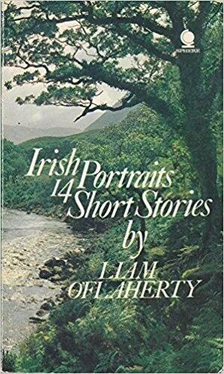“Very well, only …”
“Silence,” whispered Mr. Timmins, blushing and shaking his fist. He heard the maid’s footsteps. Mr. Timmins did not look towards the maid. Neither did he think of her. He answered her severely when she asked him if his untouched soup had not been to his liking. He felt a meaningless anger that he had not experienced for years. Hosts of things contributed to produce this anger, trivial things like his new underwear and his wife’s yellow skin, weighty things like the consciousness of his own arid years that had never known the softness and subtle passion of love. And he wanted revenge, violent and immediate, a breaking forth that would shatter everything, even his own life and his hope of Paradise.
His appetite was gone, but he wanted to drink. He wanted to go to the sideboard, put a decanter to his lips and spill it down his throat. But he was afraid of his nephew. The young brute. Just like his dead father, who had got drunk on the night after his young wife’s funeral and had to be brought home from an improper house.
“He has something to say to me,” thought Mr. Timmins. “Very well. Nothing he can say will alter my determination to get even with this young ruffian. He’s laughing at me. Upon my soul he is.”
Not a word was spoken for the remainder of the meal. The nephew ate ravenously, utterly indifferent to the twitching, angry countenance of his uncle sitting opposite him. Mr. Timmins made a pretence of eating, but each mouthful stuck in his throat. The sound of the maid’s footsteps excited him now, just as the contour of her figure had done in the hallway. And under cover of the new silent anger that had hardened his soul, he conceived an extraordinary and intoxicating desire to … Each time she bent over him he thought of it with a most diabolical pleasure. There was a soft sweet scent from her hair and even from her white apron when she bent over him. The starched apron crinkled, pressed out of shape by her bending supple figure. He was acutely conscious of every sound and movement she made and of her shape, even though he didn’t look at her. When they were finished their coffee, Mr. Timmins said:
“You may leave the table. I’ll hear what you have to say in the drawing-room,”
The nephew grunted and went out. Mr. Timmins looked about him stealthily and fondled the tip of his beard. Then he drank two large glasses of port in rapid succession. His head became giddy for a moment. Then he grew exalted. A melancholy sensation that was very pleasant overcame him. Walking very erect, with his hands clasped beneath his shoulder-blades, he went into the drawing-room. The nephew was standing by the fire, leaning his arm on the mantelpiece, with his head bent. He tapped the fender with his toe.
“Well,” said Mr. Timmins.
The nephew looked up and folded his arms.
“I owe some money,” he said. “It’s got to be paid or I’m ruined.”
“Money,” said Mr. Timmins.
“Yes,” said the nephew in a hoarse voice. “A Jew. He won’t wait. I put him off for two months. It’s fifty quid.”
Mr. Timmins walked backwards into a chair and sat down.
“Not a cent,” he said, in a calm voice through his teeth. “Not one penny of my money are you going to get. Do you hear?”
“Very well,” said the nephew, shrugging his shoulders. “Only he’ll come down on you.”
“Not a penny,” repeated Mr. Timmins.
Suddenly the nephew thrust his head forward and muttered angrily:
“D’ye think it’s any pleasure to me to spend yer rotten money or to live in this deadhouse? Why didn’t ye let a fellah have a bit o’ fun in the house? Where am I to go except to a pub when I want to talk to the lads? There never was anything here only the lives of the saints and novenas to the Holy Ghost an’ castin’ my father’s name at me. God damn the two of ye. Take it or leave it. I know the dodge. But ye’re not gettin’ me into yer office. I’d rather go to Liverpool and work as a navvy and fry a steak on a shovel. I’ve got my strength an’ I’m not dependin’ on you for my lodging.”
Beating his broad chest with his clenched fists and muttering something under his breath, he walked heavily out of the room and banged the door after him.
For a long time after he had gone, Mr. Timmins sat with his mouth open, without thought. Still without thinking he went into the dining-room and went to the sideboard. He poured out a measure of brandy and tossed it off. He paused, shivered and filled out another measure rather unsteadily. As he was slowly raising it to his lips the maid entered to clear the table. He started and looked her boldly in the face.
Although she had been in the house for six months, this was the first time that he had looked her in the face. The liquor had lent him new eyes and they saw that her face was willing and as bold as his own turbulent desires. She had a handsome face with a skin the colour of milk. Her eyes were quick and passionate. They did not flinch or get excited under his gaze. They were not innocent. Her lips were avaricious. He could bargain with them. He saw and understood all this, because it seemed that the devil had lent him a new brain with the new eyes. He smiled on her. She answered him with another smile and then she said respectfully, as she put a tray on the table:
“I’m afraid you didn’t find the dinner to your liking this evening, sir.”
Mr. Timmins fluttered his fingers a trifle drunkenly.
“That doesn’t matter a bit. Funny, I don’t know your name.”
“Kitty, sir.”
“Kitty. Ahem! Yes. Kitty. Isn’t there a song Oh, Kitty, will you marry me?’ I think I heard it somewhere.”
The parlourmaid bent her head, shot a glance at him from under her dropping lashes and laughed slyly. Mr. Timmins flushed and tried to laugh also, but his lips were dry. His head became full of hot vapour and his limbs became loose. Without knowing what he was doing, he went towards her and held out his hand. Without looking, she caught his hand and put it away gently from her waist. He left the dining-room, raising his feet high off the floor. He staggered into the armchair by the fire in the drawing-room and stared into the fire, contemplating in ecstasy the fantastic visions that swam into his mind through clouds of vapour.
As if to conceal the lovely, sinful visions from his wife, he suddenly became enraged with God and with his neighbours and with the societies of which he was a member. He showered unuttered blasphemies and curses on them all and sneered contemptuously on all the monkish men and skinny women that lived around him in smug, silent houses. He cursed the folly of his past life, his unspent departed youth and the misery of a Heaven in such company. With glee he shattered with a wish all that he had fought to gain in the hereafter, by penance and the curbing of his nature.
And in this mood he became cunning and laughed slyly to himself, seeing the cunning profligacy of his nephew, as a cunning predatory bee, stealing the honey that fools had gathered and left untouched. And he decided to do likewise, to be cunning also, without belief, a hypocrite, a profligate.
As he rose unsteadily to his feet, he heard a voice say within him:
“My age does not matter. Nor my bony thighs. I have money, I can buy her. Lots of she things. They gave girls to old Solomon.”
He walked to the door leading into the dining-room on tiptoe and saw her bending over the empty tablecloth with a crumb-brush. He made a sound with his lips. She looked up. He smiled. She glanced towards the door that led into the hallway and then looked coldly into his face. He beckoned to her. She did not move and her face looked indignant, but his new cunning saw something in her eyes and lips that made him hurry forward to her round the table. He put his arm round her motionless body and began to whisper into her ear. She kept saying something to which he did not listen, and then he began to shower kisses on her neck, her forehead and her hair. With his trembling hands he pressed her to him, crushing her against the table. And she murmured, struggling to free herself:
Читать дальше












